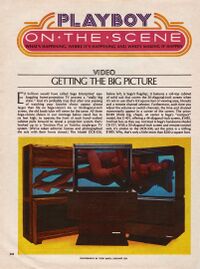Sega-Vision
From Sega Retro
- For the handheld device, see Sega Vision.
The Sega-Vision was a US television set created by Sega and was the company's first product meant for the home. It was designed by Earl "Madman" Muntz in 1976, a businessman known for wacky television adverts and for coining the phrase "TV" in America. Sega had acquired his company, Muntz Manufacturing, Inc., in June 1976[1], and is thought to have begun selling these units in 1977.
Contents
Hardware
The Sega-Vision is one of the first (if not the first) rear-projection television sets (RPTV) to be released to consumers. While technically the same as the more widespread "direct-view" CRT technology widely used in televisions at the time, the resulting image is projected onto a blank canvas, being enlarged in the process (similar to how cinemas operate with film). This allows the Sega-Vision to be significantly bigger than most TV sets at the time, as this system costs significantly less than producing ever larger CRT displays, however picture clarity is reduced and the system does not operate as well in low light environments.
Sega-Vision sets came in either 44-inch or 50-inch screen varieties, with cabinets standing between five and six feet.
Models
Three models of Sega-Vision were produced:
- Model DCR-530 (MSRP $2395): The flagship model of the Sega-Vision, the television has a 50" diagonal-inch screen and a solid oak roll-top cabinet that covers the screen when not in use. The model comes with a remote control and displays the current channel and time when adjusting volume or switching channels.
- Model C-401 (MSRP $1495): As the budget model, the C-401 has a smaller 44" diagonal-inch screen and lacks the roll-top covering of the DCR-530.
- Model CR-511 (MSRP $1895): An upgraded version of the C-401, the model features a larger 50" diagonal-inch screen and remote control unit.
History
Release
Sega used then-Los Angeles Dodgers' first baseman Steve Garvey to promote the television set in TV advertisements. A system is also known to have been a prize in a 1970s edition of The Price Is Right.
Legacy
It is not known how many Sega-Vision units were made, however all three models are extremely rare, suggesting the endeavour was not a huge success. To date the Sega-Vision is the only commercial television to be produced by the company.
While the technology was scarcely seen in the home, projection TVs were used in arcade games. Sega had previously used this technology in arcade games such as Bullet Mark, but would continue to use rear projection technology to produce "big" screens until the early 2000s, when LCD monitors became more reliable and more affordable.
Promotional material
<mediaplayer>File:Segavision.flv</mediaplayer>
